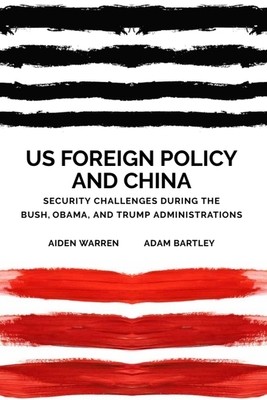
- We will send in 10–14 business days.
- Author: Aiden Warren
- Publisher: Edinburgh University Press
- ISBN-10: 1474453058
- ISBN-13: 9781474453059
- Format: 15.8 x 23.6 x 2.3 cm, hardcover
- Language: English
- SAVE -10% with code: EXTRA
Reviews
Description
Examining the 21st century presidencies of the United States and their comparative policies, strategies, attitudes and behaviours towards the People's Republic of China.
- Comprehensively examines the three 21st Century U.S. presidential administrations and their foreign policies toward China
- Provides a detailed analysis of Trump's first term in office
- Focuses on the key security challenges relating to, among others, Chinese military modernization, South and East China Seas, the Indo-Pacific region, the Belt and Road Initiative, nuclear modernization
This book draws critical attention to the core security challenges that have defined U.S. foreign policy in relation to China and its rise on the international stage. During the administrations of Presidents George W. Bush and Barack Obama the traditional safeguards and stabilizers to strategic competition were broadly adhered to, albeit in some cases not without great difficulty. Under the leadership of Donald Trump and China's Xi Jinping, however, these bulwarks have alarmingly diminished. Abrupt departures in engagement platforms and asserting regional defensive postures have become the new norms.
With brevity and nuance, this book provides much needed connective tissue in examining these departures and their antecedents across the Bush, Obama and Trump administrations. It reveals Washington and Beijing are moving towards a new period where, unlike previous ones, this one will be characterised by an amplified preponderance of competition, and the enhanced probability of conflict and confrontation.
EXTRA 10 % discount with code: EXTRA
The promotion ends in 9d.11:11:03
The discount code is valid when purchasing from 10 €. Discounts do not stack.
- Author: Aiden Warren
- Publisher: Edinburgh University Press
- ISBN-10: 1474453058
- ISBN-13: 9781474453059
- Format: 15.8 x 23.6 x 2.3 cm, hardcover
- Language: English English
Examining the 21st century presidencies of the United States and their comparative policies, strategies, attitudes and behaviours towards the People's Republic of China.
- Comprehensively examines the three 21st Century U.S. presidential administrations and their foreign policies toward China
- Provides a detailed analysis of Trump's first term in office
- Focuses on the key security challenges relating to, among others, Chinese military modernization, South and East China Seas, the Indo-Pacific region, the Belt and Road Initiative, nuclear modernization
This book draws critical attention to the core security challenges that have defined U.S. foreign policy in relation to China and its rise on the international stage. During the administrations of Presidents George W. Bush and Barack Obama the traditional safeguards and stabilizers to strategic competition were broadly adhered to, albeit in some cases not without great difficulty. Under the leadership of Donald Trump and China's Xi Jinping, however, these bulwarks have alarmingly diminished. Abrupt departures in engagement platforms and asserting regional defensive postures have become the new norms.
With brevity and nuance, this book provides much needed connective tissue in examining these departures and their antecedents across the Bush, Obama and Trump administrations. It reveals Washington and Beijing are moving towards a new period where, unlike previous ones, this one will be characterised by an amplified preponderance of competition, and the enhanced probability of conflict and confrontation.


Reviews